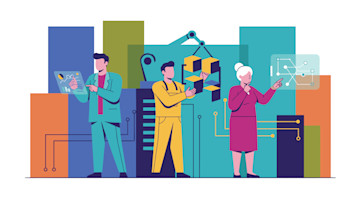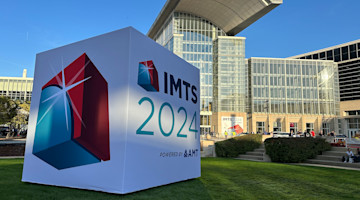Germany's manufacturing industry, particularly in forming technology and mechanical engineering, faced a mixed bag of challenges and opportunities in 2023 and early 2024. Despite a slight decrease in production and a notable decline in domestic sales, the sector demonstrated resilience through increased exports and foreign orders, largely driven by collaborations with the automotive industry and smaller clients in sheet metal processing. However, the industry encountered headwinds in the form of declining orders both domestically and internationally, reflecting global economic uncertainties and geopolitical tensions.
The emergence of the battery market presents a promising avenue for growth, yet European manufacturers must overcome the dominance of Asian competitors by embracing integrated factory solutions. As the industry navigates these challenges, strategic investments and partnerships will be crucial to maintaining competitiveness and seizing opportunities in the evolving global landscape.
German mechanical and plant engineering saw a continued decline in orders, both domestically and internationally. January's order intake dropped by 10% compared to the previous year, with domestic orders down by 11% and foreign orders by 9%. Orders from eurozone countries fell sharply by 19%, while non-eurozone countries experienced a milder decline of 5%. The decline is attributed to delayed global economic recovery and geopolitical uncertainties. The lack of positive investment impulses remains a concern. Over the last three months leading up to January 2024, orders decreased by 10%, with domestic orders down by 13% and foreign orders by 8%. Overall, the outlook remains challenging, with ongoing geopolitical challenges and downward revisions in growth forecasts for Germany.
The potential in the battery market for German and European machinery and plant manufacturers remains promising. Currently, about 200 battery factories around the world are either under construction or in the planning stage. These facilities are primarily equipped with production technology from Asia. The market for energy storage is expected to grow from $20 billion annually to approximately $600 billion by 2030.
Currently, only 8% of high-tech equipment for battery factories comes from Europe, a negligible share that doesn't influence technological development, the study notes. The authors estimate that at least 20% is needed to have a significant impact. European manufacturers can achieve this goal through integrated factory solutions. While the European industry is technologically on par, Chinese companies offer complete turnkey battery factories, reducing interfaces and minimizing the time and financial risks associated with construction.
A few recently announced projects and investment news items are listed below for your reference.
Siemens Mobility is investing $125 million in building a new digital engineering factory and R&D center in Chippenham, Wiltshire, in England. This facility will replace Siemens’ current rail infrastructure site in Chippenham to meet the growing demand for rail technology worldwide.
Projects led by Nissan, YASA, EMPEL, and Jaguar Land Rover total $92 million in the U.K. Nissan will invest in R&D capabilities while collaborating with U.K. partners on further enhancing EV 4R (refabricate, recycle, resell, and reuse) potential. YASA will develop a dual inverter for regenerative braking in BEVs, enabling new vehicle designs with EV-specific, optimized electronics and safety systems. EMPEL Systems will develop U.K.-designed and sourced innovative silicon carbide power modules for use in high-efficiency automotive inverters and DC-DC converters. Jaguar Land Rover will develop a next-generation EDU “toolkit,” a modular family of electric machines, inverters, and transmissions for future vehicle platforms.
In 2024 and 2025, MAN Truck & Bus will establish battery repair centers in Italy, Denmark/Norway, Austria, Belgium, Netherlands, France, Poland, and the U.K., with further countries in Europe being planned. Millions will be invested in these centers over the next two years. Two battery repair centers are already in operation in Germany (Hanover-Laatzen) and Spain (Barcelona). The rollout of the battery repair hubs in Europe is necessary because the first units of the new MAN e-truck generation will be delivered to customers in 2024. Over 1,000 battery-electric MAN city buses and more than 2,400 all-electric MAN vans are already on Europe's roads. With the ramp-up of MAN e-truck production, the electric vehicle population will continue to increase significantly in the coming years. The Munich-based commercial vehicle manufacturer is preparing intensively for this within its service organization.
In Spain, Navantia announced plans to invest $47 million in the shipyard in Puerto Real, Cadiz, to increase its competitiveness and optimize its facilities for upcoming shipbuilding and offshore wind energy programs. The economic injection aims specifically to increase the quality and efficiency in the programs in which the shipyard participates, both in offshore wind energy and shipbuilding, by modernizing the flat block workshop with an automated flat panel manufacturing line.
Rolls-Royce Submarines announced plans to open new offices in Cardiff and Glasgow in the U.K. to attract the best talent and meet growing demand from the Royal Navy and the recent AUKUS announcement. The locations of satellite offices in Cardiff and Glasgow, funded by the U.K. Ministry of Defense, have been selected to help access the skilled talent pools in both regions, with more than 100 jobs being created in each city.
Gestamp is investing $60 million in a new plant in Navarra, in northern Spain. The planned investment includes the construction of production and logistics facilities, a two-story office building, and a distribution substation. The planned production lines will include two hot stamping presses, laser cutting lines, and assembly lines. The facility is expected to be operational by March 2025.
Turkish defense company Baykar has started building a factory near Kyiv, Ukraine, to manufacture TB2 or TB3 drones. The company gained global prominence after being used by Ukraine's military to thwart Russian forces by destroying armored vehicles and artillery systems. Baykar has said it has signed export deals for its TB2 drone with 30 countries.
German and Danish leaders have announced a collaborative effort to construct a new ammunition factory, aimed at bolstering Europe's response to Russian aggression in Ukraine. Rheinmetall will undertake the construction of the facility in Unterluess in northern Germany. Expected to produce 200,000 artillery shells annually, along with 1,900 tons of RDX explosives and other components, the project carries an estimated cost of up to $328.66 million. Construction is slated to commence in 2025. This initiative seeks to support the Ukrainian army and contribute to meeting NATO's defense expenditure target of 2% of GDP.
For more information, please contact Conchi Aranguren at caranguren@AMTonline.org.






